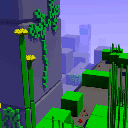I’m thinking about putting up some more content here, but first I’m wondering if anyone actually reads this stuff. It was started as a rather self-indulgent excercise, and I’ll probably continue it in that vein, but if anyone else is interested, I’d like to know what you come here for. Respond in the comments below, and otherwise, I’ll update when I feel like it!
Blog Archives
Uplift: The Game, The Name
Aside
Working on a game concept: codename Uplift.
Where did the name “Uplift” come from? There are a few reasons, that make sense.
- One of the main mechanics is lifting large blocks of stone and earth.
- It involves elevating unintelligent creatures to intelligence, technology, and civilization.
- It is intended as a step between Minecraft and Fledgeling, an attempt to raise the expectations of gamers without attempting any mind-breaking leaps.
Further details forthcoming!
Processing Puns and Roots of Language
Aside
Puns get a bad rap. I’ve seen a lot of people disparage the humble pun as being unworthy of attention, or even admiration. This may not seem like a big deal, but here’s why I think it matters a lot. Continue reading
Linguistic De-coupling
Aside
Do not abuse language. If you try to bend language too much, it will just delaminate from the hearer’s consciousness, and inhabit a separate space from their perception of reality. You won’t be talking about anything your audience knows or cares about. You’ll just be talking to yourself. Continue reading
What is Fledgeling?
Aside
Fledgeling is a numeric role playing framework with integrated Simulated Intelligence and nested fractal structure.
Fledgeling is a computer game. Sort of. It is also a game engine.The TableTop RPG analogy is probably the best. Fledgeling is an attempt to fabricate a computer program that can act as both mediator and storyteller, with the ability to adapt to player actions. So basically we’re trying to make an AI DM.
The overview page says the same thing in more words.
On how minds turn
Aside
Fledgeling is, at its core, a game about your mind.
No, not the character’s mind, the player’s mind.
The mind that is reading this sentence right now.
Your mind is dumb. I want to build you a better one. Construct something new with the rubble that is left, once you have seen what I have seen.
Oh? Your “sanity” is strong? Perhaps it is. Perhaps it will withstand the blows, the rocking shift beneath your feet, as the soil turns to sea. Can your philosophy survive at twenty thousand feet underwater? Perhaps it will.
You may be blind to the implications. Perhaps, both unseeing and unhearing (or lashed upon the mast) you will sail past the sirens. You could come, unaltered, to familiar soil, and eat the same bread you ate before.
But then, if Fledgeling does not change you, why would you play at all?
Computer Toys
Aside
I’m going to say up front that I can be sloppy with terminology. I re-define words mid-argument and occasionally use words as their antonyms. It should therefore come to no surprise that, on a blog almost entirely focused on computer games, I use the term “computer games” with a bit of latitude.
There is a real and useful distinction between games and toys, and I intend to ignore it. The term “game” is used to denote an activity with a clear win condition. A toy is just something you play with. One could hardly call Minecraft a game; It’s more of a toy really. Yet, no one refers to Minecraft as a “computer toy”. That makes it sound like a pink plastic fake laptop that plays children’s songs when you press any one of the six oversize keys. But, “computer toys” (like Minecraft) are important, and employ many of the same design principles as games. So, throughout this website, I’ll be using the term “game” in all its permutations (computer game, game design, etc) to refer both to computerized games, and computerized toys.
Please forgive me.

